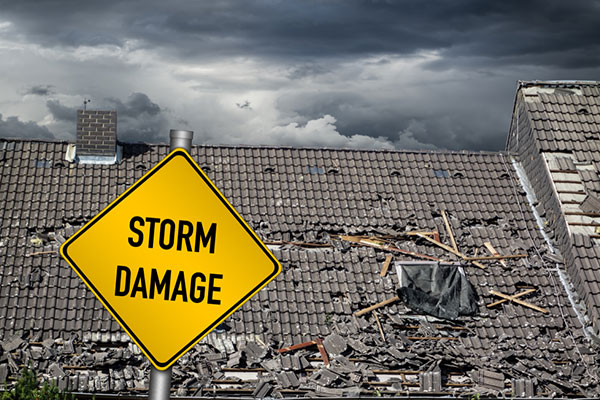How to be the Go To Contractor for Roof Storm Damage in Your Area
Author: Sheryll Poe | February 13, 2023
Hurricane season is here, which means residential roofing contractors will be busy dealing with an onslaught of roof storm damage. While it remains unclear if this season will be more destructive than last year's record-breaking 30 named hurricanes, which caused more than $51 billion in damages, roofing contractors should be prepared for more business as well as some unscrupulous competitors in the form of "storm chasers."

Before Storm Season
Make sure you've established relationships within your local community before a big storm hits. Getting your business's name out there and being active in your community through activities such as fundraising and volunteering ensure that your company remains top of mind with homeowners when they need roof storm damage repair.
Immediately After a Storm
The first priority for a residential roofer after a big storm or hurricane should be to help with cleanup and provide the temporary fixes necessary — such as tarps and extra plywood — to prevent further roof storm damage to the home from any subsequent bad weather.
After the weather clears, roofing contractors should thoroughly inspect the roof for signs of failure and damage caused by hail, high winds and fallen debris. Consider offering no-cost roof inspections to storm-impacted homeowners, and make sure to provide photos of what the storm did or didn't do.
Next, a good roofer will want to talk to the homeowner to determine the best course of action and go over the existing roof warranty and any insurance payout options. If you have an insurance specialist on staff, let the homeowner know you're in a position to help them file the necessary paperwork for a homeowners insurance claim at no additional cost to them.
Keep an Eye Out for Storm Chasers
Areas hit by hurricanes and major storms can be magnets for out-of-town roofing companies. These "storm chasers" will often come into a neighborhood immediately after a natural disaster looking to make some fast money off of vulnerable homeowners. These fly-by-night operators often make false claims about their work and experience, insist on full payment upfront or even create damage where none previously existed. By having an established presence in your community, you can outshine any new competition.
Stay Up to Date with Building Codes
It's important for roofers in heavy hurricane areas to make sure they're keeping up with their city or municipalities' latest building codes. Build a good working relationship with the authorities in your jurisdiction that oversee compliance. This is usually someone in the building department or the building inspection office. Qualified officials in these government offices are useful contacts to have during hurricane season. They may also be a source you can trust to report any storm chasers who have moved into your area to take advantage of your customers after a big storm.
Use Technology
Stay ahead of the storm and any subsequent bad weather by paying close attention to news broadcasts and utilizing real-time weather apps. Contractors working with Beacon Roofing Supply have access to Beacon PRO+, a unique digital platform that lets them manage their businesses safely and remotely, from building estimates to product ordering and delivery.
With Beacon PRO+, contractors can utilize real-time storm reports and maps to help plan ahead and connect with customers quickly after a major weather event. Additionally, contractors can use Beacon PRO+ to offer Beacon Homeowner Financing, which can help you sell a job and give homeowners the peace of mind they need to start a project.